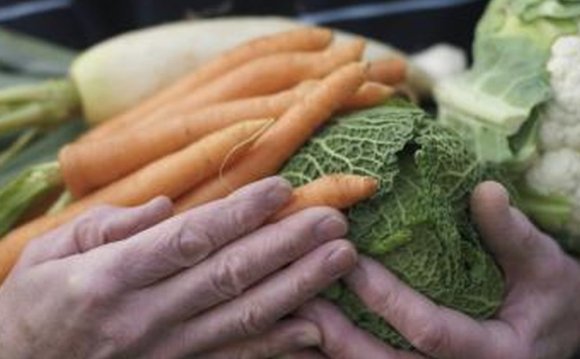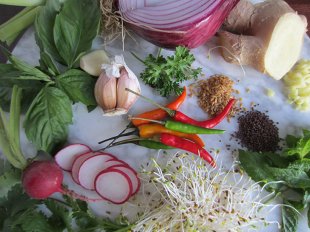
 Photo from: "Eat Well, Be Well: Ayurveda Cooking for Healthy Living” by Lois Leonhardi
Photo from: "Eat Well, Be Well: Ayurveda Cooking for Healthy Living” by Lois Leonhardi
Kapha is balanced by a diet of freshly cooked, whole foods that are light, dry, warming, well spiced, and relatively easy to digest – ideally served warm or hot. These foods calm kapha by balancing mucous production, regulating moisture levels, maintaining adequate heat, and by supporting proper digestion and elimination. Because kapha is so substantive in nature, an appropriate diet is actually one of the most effective ways to reel it in. Kapha thrives on a fairly minimalistic diet with smaller meals, little to no snacking, fewer sweets, an abundance of fresh fruits and vegetables, a variety of legumes, little to no alcohol, and lighter fare all around. That said, finding a diet that is appropriately satisfying is crucial to your success; so it’s extremely important that you enjoy the foods that you do eat. What follows are some specific principles that we hope will empower you in discovering a kapha pacifying diet that works for you.
Qualities to Favor and Avoid
Kapha is heavy, cool, oily, and smooth, so eating foods that neutralize these qualities – foods that are light, warm, dry, and rough – can help to balance excess kapha. This section offers a closer look at the qualities of various foods. An improved understanding of these qualities can guide you in making specific dietary choices that will better support kapha.
Favor Light and Airy Over Dense and Heavy
Foods that embody the light quality are the antithesis to kapha’s heaviness. Lightness can be determined both by the sheer weight of a food and also by it’s density. Fruits and vegetables are typically wonderfully light, so a diet that is built around a tremendous abundance of fresh fruits and vegetables, preferably cooked, is a great start. A modest amount of raw fruit may be suitable, and, in moderation, kapha is also balanced by salads and other raw vegetables when seasonally appropriate (usually in the spring and summer months). Green or black teas are quite light, especially when compared with coffee. In general, foods that are too heavy for kapha include hard cheeses, puddings, nuts, cakes, pies, wheat, most flours, breads, pastas, red meat, and deep fried foods, which are also excessively oily (see below). Eating too much in one sitting also leads to excess heaviness, so it’s important not to overeat. A good rule of thumb is to fill the stomach 1/3 full of food, 1/3 full of liquid, and to leave 1/3 empty for optimal digestion. Very heavy meals and highly processed foods also tend to aggravate kapha’s heaviness and are best avoided.
Favor Warm Over Cool or Cold
The warm quality can be emphasized by eating foods that are warm in temperature or that have a warming energetic – and by using heating spices generously (most spices are naturally heating, and almost all of them balance kapha). Cooked foods tend to offer a warmer energetic and are typically easier to digest; so cooked food is preferable – especially in the colder months. Kapha does best to drink only room temperature, warm, or hot beverages and often benefits from sipping on hot water throughout the day, or even warm water with a dab of raw honey in it – honey is both heating and detoxifying. On the other hand, it is best to avoid foods with a cooling energetic, cold and frozen foods or drinks, carbonated drinks, and even leftovers that have been kept in the refrigerator or freezer. The cold quality is inherently increased in these foods, even if they are served hot. Consuming large quantities of raw fruits and vegetables can also be quite cooling, so it is best to enjoy these foods in small quantities and only when seasonally appropriate.
Favor Dry Over Moist or Oily
Kapha’s oiliness is offset by exceptionally drying foods like beans, white potatoes, dried fruits, rice cakes, popcorn, and an occasional glass of dry red or white wine. When cooking, it is important to use an absolute minimum of oil and, when necessary, to substitute water for oil to prevent sticking. Oily foods like avocado, coconut, olives, buttermilk, cheese, eggs, cow’s milk, wheat, nuts and seeds should also be reduced or eliminated. Also, because kapha can and does retain water easily, it is best not to overhydrate. Drink only the amount of fluid that your body requires, according to your climate and activity level. In addition, avoid especially moist foods like melons, summer squash, zucchini, and yogurt, as these can be kapha provoking.
Favor Rough Over Smooth
There’s a reason that fruits and vegetables are sometimes called roughage; their fibrous structure gives them a very rough quality. This is why kapha responds so well to eating large quantities of fresh fruits and vegetables. That said, these foods are often much easier to digest when cooked, so be careful not to overdo raw foods and use the seasons as a guide for if and when raw is appropriate at all. Some foods, like broccoli, cabbage, cauliflower, dark leafy greens, and many beans are exceptionally rough and are therefore wonderful for countering kapha’s smooth, oily nature. Conversely, eating foods and preparations that are smooth in texture – things like bananas, rice pudding, hot cereal, milk, cheese, and the like – can quickly aggravate kapha.
Tastes to Favor and Avoid
Kapha is pacified by the pungent, bitter, and astringent tastes and aggravated by the sweet, sour, and salty tastes. Understanding these tastes allows us to better navigate a kapha pacifying diet without having to constantly refer to extensive lists of foods to favor and avoid.
Emphasize
Pungent
- Pungent is a spicy, hot flavor like that found in chilies, radishes, turnips, raw onions, and most spices. In fact, most spices are tremendously kapha pacifying – see our list of foods to favor and avoid.
- The pungent taste is light, hot, rough, and dry – all beneficial for kapha. In essence, if you like spicy or fiery hot, go for it. And even if you don’t, favor a wide variety of milder spices in your dishes – things like cardamom, cloves, cinnamon, cumin, ginger, garlic, paprika, and turmeric.
- The pungent taste cleanses the mouth and clarifies the senses. It stimulates digestion, liquefies secretions, clears the channels of the body, encourages sweating, and thins the blood.
RELATED VIDEO












